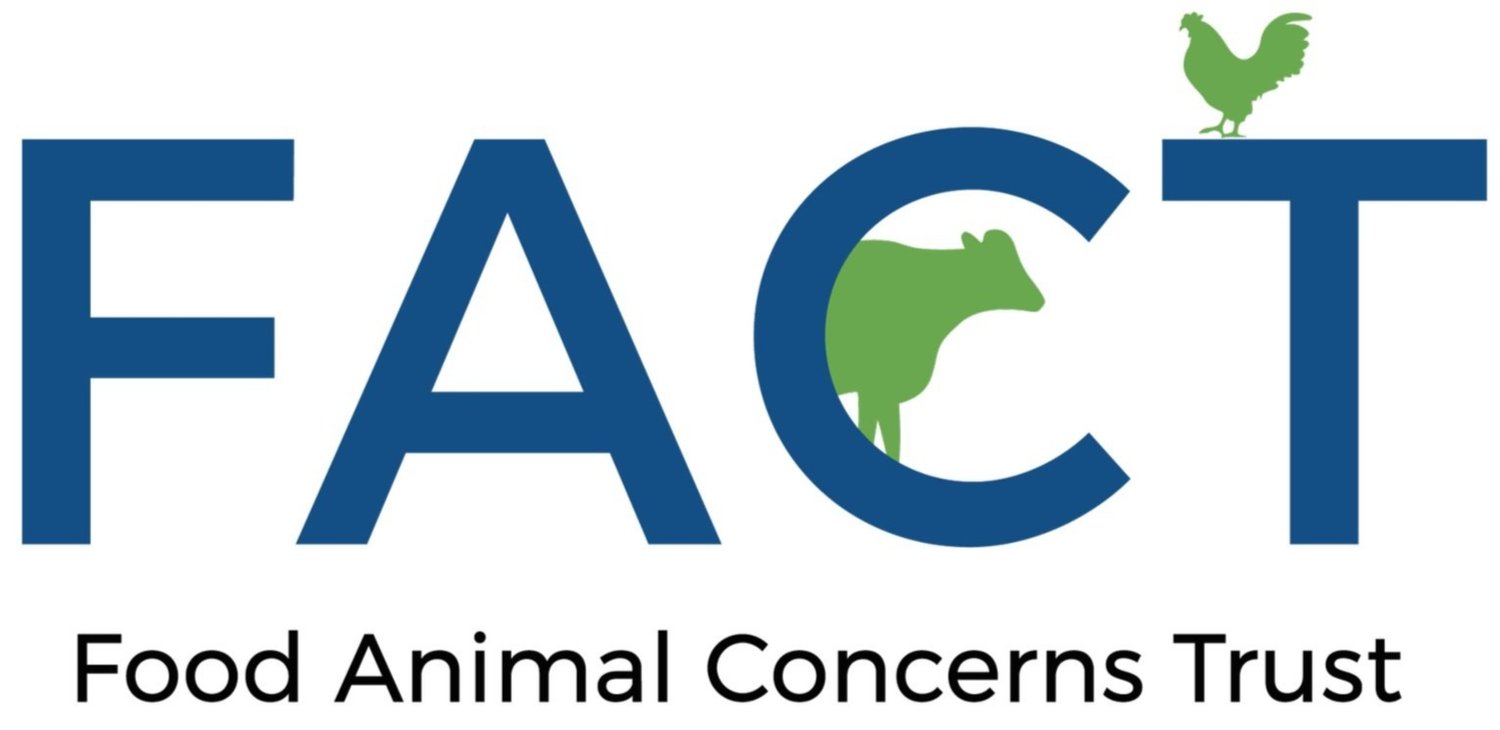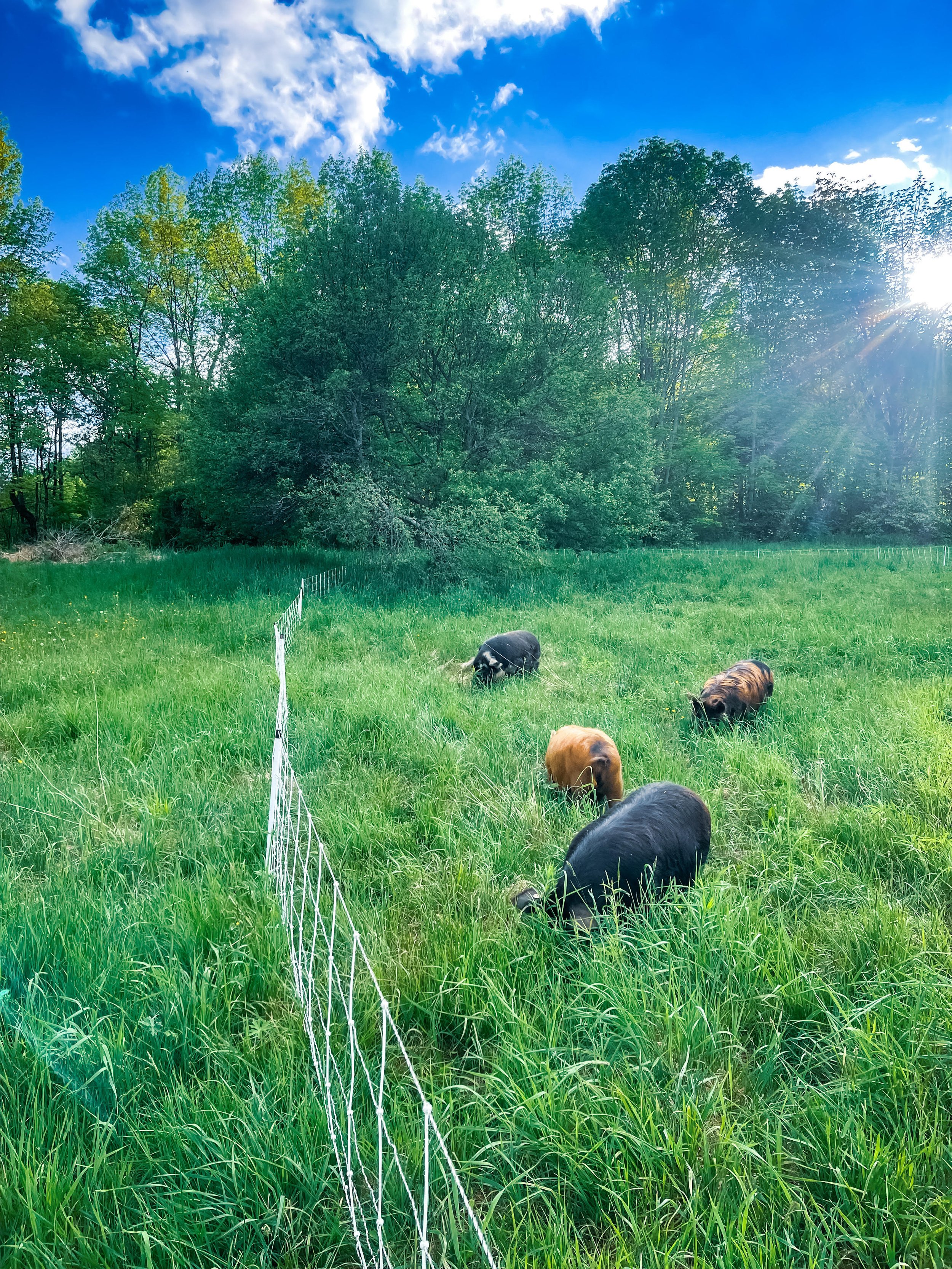FACT helps farmers raise healthy animals and regenerate land
At FACT, we invest in family farmers with our Humane Farming Program. We provide webinars, scholarships, online courses, and Fund-a-Farmer Grants to educate and empower farmers who seek to raise their animals humanely.
Today, we’re sharing stories from two of our 2022 grant recipients: Malachi Muhammad, The Nation’s Farm in Covington, Georgia, and Filipa Rodrigues, Saudade Farms in Sherburne, New York. Read their stories to see FACT’s work in action:
The Nation’s Farm: Soil-Building as the Foundation of Health
Malachi and Alayjah on their farm
Malachi Muhammad and his wife Alayjah bought their farm in Covington, Georgia back in 2020 after Malachi finished his master’s program in plant and soil science at Tuskegee University. Malachi planned to farm organically and cultivate the healthiest soil he could because he knew it would create the healthiest vegetables. To fertilize the soil, he got a flock of chickens (known for their high-nitrogen manure).
Early on, he built a fence to protect the chickens from predators. He enclosed a small pasture--about three-quarters of an acre at first. He also got sheep and goats, which he kept in the same area as the chickens.
He planned to expand the fence and eventually have two pastures so that he could move the animals back and forth which would give each pasture a chance to recover from the animals’ grazing. But before he could do that, Malachi noticed a problem.
“The sheep were overgrazing the grass and cutting it really low—cropping it to where it was having issues growing back,” he said. “When the grass is cropped it increases the likelihood of animals coming into contact with parasites that live close to the soil surface.”
He also wanted his animals to be 100% grass-fed which was not possible because the sheep were overgrazing. This was at the height of the pandemic when supply chain problems led to shortages and high prices for the materials he needed. Malachi said it was tough to make progress at first.
That’s when he started looking into grants for farmers.
Malachi’s project aligned with FACT’s goals and last year he was awarded a $3,000 grant to build a larger fence and create two pastures for rotating his chickens, sheep, and goats. Malachi has already expanded the pasture by an acre using the grant money and will finish the project this year. He says his animals will eventually be 100% grass-fed. And he likely won’t have to use antibiotics, because he’s avoiding many diseases by rotating his animals and ensuring that they have fresh air and sunshine.
“Farming is a constant learning process.” - Filipa Rodrigues
New Farmer Brings Pastures Back to Life in Central New York
Filipa Rodrigues of Saudade Farms started her farming journey in 2015, a few years after she moved to the U.S. from Portugal.
She started with three chickens in her suburban backyard in Austin, Texas. Chickens were her “gateway drug” into animal husbandry and soon she wanted to learn everything she could.
Filipa volunteered once a week at a local dairy farm, where she eventually became the goat herd manager for 50+ goats. In 2018, she started her own herd on eight acres at that same dairy farm. And in 2020, she and her husband decided to buy their own land for farming.
“We looked during the pandemic when prices were going up like crazy and our options were slimmer,” Filipa said. “We found affordable land in central New York. It’s an area with a big agricultural community – there are so many farms. We love the land that we live on. Nobody has farmed here for generations but it used to be a dairy farm.”
Filipa and her husband moved their animals (by this point they had sheep, pigs, and some cattle) from Texas to New York.
As a first-generation farmer, Filipa says she was constantly learning. Early on, she took several free webinars through agriculture universities and other sources to learn more about caring for her animals. Because their land in New York hadn’t been farmed for years, it was overgrown with shrubs and other brushy vegetation. She knew the animals would benefit from native grasses if she could rehab the pastures.
Courtesy of Saudade Farms
“We wanted to start bringing our pastures back to life,” Filipa said. “We needed mobile fencing and shelters so that our sheep and pigs could eat the brush and work the soil.”
That’s when Filipa found out about FACT grants and realized that it was a natural fit for her farm. Filipa received the grant in March and was able to rotate her sheep and pigs into the overgrown pastures that summer.
“All the brush disappeared,” she said. “My sheep did a wonderful job eating the brush. And the pigs worked the soil. By June or July, we had a portion of the land cleared and we could see signs of very healthy grass growing. By August it was very lush. Water is so abundant in this area and to see how quickly the pastures were regenerating was fascinating to me.”
Filipa plans to keep rotating her sheep and pigs into the overgrown areas on the farm and eventually rehabilitate all of the pastures into nutritionally rich native forage for her animals to eat.
We’re excited to see what the future holds for both of these new farmers!
***
You can support our work by making a donation to FACT today.
This story was adapted from an article written for RethinkRural.com and is published here with permission. Special thanks to author Sarah Snipes for her work researching and crafting this piece.



